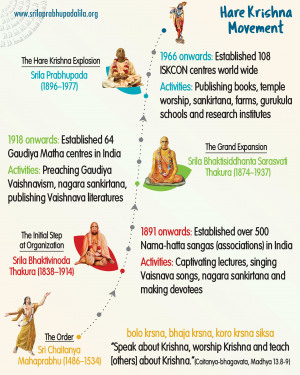From Imperfection, Purity Would Come
Bhaktivinoda Thakura, in the Sri Sri Godruma Kalpatavi, describes the system of nama-hatta preaching wherein devotees, although pursuing their occupational duties in the world, would come together regularly for hearing and chanting. He drew the analogy of a marketplace wherein those seeking the holy names would have to pay with their faith (sraddha) in the names. And he predicted the formation of a Krsna conscious society: "Although there is still no pure society of Vaisnavas to be had, yet Lord Caitanya's prophetic words will in a few days come true. I am sure. Why not? Nothing is absolutely pure in the beginning. From imperfection, purity would come about."
Srila Bhaktisiddhanta Sarasvati Thakura, the son of Bhaktivinoda Thakura, reestablished the Sri Visva-vaisnava-raja-sabha in 1919, which later became known as the Gaudiya Math. This was a temple and asrama combined, where renounced men could live together and worship the Deity. The Gaudiya Math spread Krsna consciousness by encouraging people to practice bhakti-yoga in their homes and by book printing and distribution, lectures, and regular programs for the public at the temple.
As a grhastha, Srila Prabhupada encouraged people to practice Krsna consciousness in their homes, but he also desired to establish a society of devotees. In 1953, he registered the League of Devotees. Later, after coming to America, Prabhupada began to assess whether a society of devotees would be possible in New York. He began holding his weekly classes and kirtanas. He gradually began building a congregation, but he envisioned bigger things. His mission was to engage everyone in the chanting of the holy name and the avoidance of sinful life.
In 1966 he established the International Society for Krishna Consciousness. He writes in his Srimad-Bhagavatam (4.12.37) purport “Factually, whoever lives in this society automatically develops Krsna consciousness."
